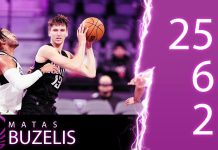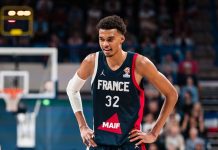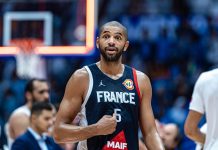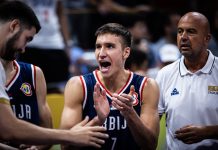 Today, we “tip-off” our Eurobasket 2013 previews. Our writer Dimitris Ritsonis will be reviewing and ranking all, or almost all, Eurobasket teams. Today we start with the projected Top 4 teams, who will fight for a medal and qualification to next year’s World Championship in Spain. So follow us on this road to Eurobasket, which TalkBasket has already begun the day after Eurobasket 2011 had ended.
Today, we “tip-off” our Eurobasket 2013 previews. Our writer Dimitris Ritsonis will be reviewing and ranking all, or almost all, Eurobasket teams. Today we start with the projected Top 4 teams, who will fight for a medal and qualification to next year’s World Championship in Spain. So follow us on this road to Eurobasket, which TalkBasket has already begun the day after Eurobasket 2011 had ended.
1. SPAIN
It now seems certain what a few weeks or even months ago wouldn’t. At the early weeks of the summer, when both Pau Gasol and Juan Carlos Navarro (the MVPs of the past two Eurobaskets) decided to opt out from this Eurobasket, Spain had no longer looked as the number 1 favourite of that coming up tournament
It had nothing to do with the fact that the Spaniards don’t possess the same talent after the 1980-born generation, especially since Felipe Reyes is skipping this summer as well. It was more concerning the lack of depth in the frontcourt, especially when Serge Ibaka also decided that he wouldn’t play as well and Nikola Mirotic had a summer of coming back and forth regarding which team he will be more of a star in in the future; Spain or Montenegro.
Nevertheless, and with no other team having managed to three-peat since Yugoslavia 36 years ago, Spain somehow has been looking as the #1 favourite. It’s not a consensus as it used to be in the past summers, the frontcourt remains thin and Marc Gasol will definitely be the go-to factor in that team all days of the week, but judging from the friendly matches, Spain still possesses that poise, that combination of motivation, talent and unity, while most of the main competitors (Greece, Serbia, France, Montenegro) lost players that summer as well.
Starting with the backcourt and the well known faces there. Ricky Rubio and Sergio Rodriguez will run the point and an ast/to great, Jose Calderon will play 100% off the ball, judging from what we’ve seen in the friendlies, backed at SG by an other ball-dominant presence in Sergio Llull. While none of them is really a SG, they can at least shoot. Europe’s biggest ego, but also the team’s new captain, Rudy Fernandez will share minutes at SF with the sudden returnee Alex Mumbru and Fernando San Emeterio.
The distribution of skillset in the perimeter is an obvious advantage, while passing game should lead that competition. However, in the paint and despite Marc’s presence, the PF position could be an issue. Victor Claver and Pablo Aguilar might be the lowest level combination they had for the past 7-8 Eurobaskets. And Xavi Rey has been a good and solid back-up for them so far, but once Marc is out, the defensive stability in the paint looks worrisome. With some squads excelling in the paint (Lithuania, Greece, Croatia, Montenegro) and some others looking more formidable in the perimeter (France only being at Spain’s league there), Spain would prefer to have a balance between the two. They won’t get it and will likely depend on Marc more than they should
Overall, likely the most talented team in a Eurobasket that lacks talent and with many teams around the same level. Nothing will be easy for Spain this time, but if they want to three-peat even without their two biggest stars, that will be a great boost prior to next summer’s home-based World Championships. Given that they play heavy opposition in Group B against Slovenia, Croatia, Georgia, Poland and Czech Republic, the Spanish will not only be vulnerable to potential group losses but might only need to force some of their key players to big minutes from the start. Their thin frontline won’t nurse injuries at a high success rate and, if they do, this might still come with some cost.
2. GREECE
Several analysts had insisted in Greece being the #1 favourite of this Eurobasket a few weeks ago, while people were seeing it coming already since mid-season. The reasons were plentiful. A good 75% of the players that could be called to the national team were enjoying career seasons, the depth in every position was ridiculous and Spain was already very likely to play without Pau Gasol and Juan Carlos Navarro.
And while both parts worked for the Greeks and also got a new coach in the very promising Andrea Trincheri, there are still concerns and absences (especially the one of Nick Calathes) that create many question-marks on whether they should even be #2. In the friendly games, after the return of Euroleague MVP Vasilis Spanoulis, it became obvious that the team will build around the 31year old combo guard, but the perimeter is very thin, with only four players in Nikos Zisis, Spanoulis, Kostas Sloukas and the wing Mike Bramos. This already means heavy minutes for the three guards (in a tourney full of games) and possibly even playing Stratos Perperoglou at off guard. Several guards were cut to reach this outcome and it right now looks as if the Greeks shot themselves in the foot with that selection.
Another issue might be defense, mainly in the paint but not only there. Kostas Kaimakoglou and Vasilis Kavvadas might indeed be the only good defensive players the Greeks have included in their entire frontcourt, which is consisting of a bunch of elite offensive players but little help on the other side. Led by Yannis Bourousis – who is now though nursing a rib injury -, Loukas Mavrokefalidis (very productive in the friendly games and should start for now) and the surprise pick up of an undersized banger in Kavvadas (instead of the highly skilled yet defensively limited Ian Vouyoukas), the center position might be among the leading ones of the tournament. However, Kavadas, originally a late call just for training purposes, is not skilled offensively.
The three power forwards, including Kaimakoglou, Georgios Printezis and Antonis Fotsis include all types of combinations in good shooting, slashing, passing and basketball IQ. Small forwards Kostas Papanikolaou and Perperoglou will give the Greeks two good shooters and maybe Papanikolaou will offer them some defensive poise with his hard-nosed game.
With a team built around the combo of Spanoulis and Zisis, however, this offensive talent could go to waste much easier than expected. The last time these same two guards were leading Greece, it was 2009 and they were almost falling down due to exhaustion in the latter stages of the tournament. Greece had managed an improbable 3rd place that summer, but they were much less talented than this time. Technically, they can go all the way, but some worries in the exhibition games, mainly after Spanoulis’ and Bourousis’ recent returns from their injury absence, proved that there are still some unbalances both in the court and in the locker room, where the minutes are decided for all players
In their first group stage, Greece will face Turkey, Russia, Italy, Finland and Sweden. Apart from the Turkey game, the rest should look like easy wins for them right now. Had it been a different summer opposition-wise, this wouldn’t be a given, but the Greeks can very well have a great tournament in Slovenia, even with all their problems. Sharing minutes, especially in the backcourt will be crucial though
3. FRANCE
The French squad is for many summers a wet dream for many basketball fans, mainly the NBA ones, but not only them. There is no other country not named USA (and very recently Canada) that can bring to the table every single aspect of the game including athleticism at its best. The French kids who play basketball have the luxury of also playing against other European teams and thus getting used to both the international and American styles of the sport at a much higher level from a relatively early age. However, all this combination of talent and athleticism has only brought them a silver medal in 2011 and a bronze medal in 2005. This, including two of the most talented generations to ever come from France. The one of Tony Parker and the one of Nicolas Batum.
The reason for that is of course Spain’s presence, but France’s lack of stability is pretty much simple. Joakim Noah. The Chicago Bulls’ center, right now a top10 in his position in the NBA, has only played for them in 2011, while they could have chased him since his Florida days back in 2006. Defense, rebounding, post scoring and – especially – passing are what he brings to the table and there hasn’t been a single center in France’s basketball that includes all four skills. With him and several other centers not included in this summer’s squad (Kevin Seraphin, Ian Mahinmi, even the draftee Rudy Gobert), France clearly got a limited ceiling in their frontcourt, which has been surprisingly partly covered by the ex-bust and recently revived Alexis Ajinca as well as the much skilled Partizan-bound Joffrey Lauvergne.
Alongside the regulars Boris Diaw and Florent Pietrus and with Johan Petro playing the minutes left and the necessary defense, France is actually not bad in the paint. After all, Diaw has become very consisted with his point forward/center role at San Antonio and can still score the mid-ranger to lift some weight from the paint teammates
The perimeter bunch is full of talent. Tony Parker is of course much improved than even the 2011 Eurobasket. Clearly Europe’s best point guard and will be good in this tourney. Even without him, though, the French already have a top-3 backcourt line. Fabian Causeur, Leo Westermann and Evan Fournier are among the ones cut or even not invited in the preliminary squad). Antoine Diot and Thomas Heurtel both had great seasons and deserve to play alongside Parker, with Diot playing surprisingly a lot of his minutes backing up Nando De Colo at SG. Nicolas Batum also has the freedom to play both SG and SF, depending on Parker’s presence in the game. Michael Gelabale and Charles Kahudi will share with him the SF minutes. This could be a very nice, deep and multi-dimensional perimeter line
France is the team with the easiest schedule among all favourites, leading a group competing against the likes of Israel, Belgium, Germany, Ukraine and Great Britain. This is a big advantage over their opponents. They could rest most of their players, avoid injuries and share minutes. This could be a very good way to hope they will go far in this tournament. Maybe farther than ever
4. LITHUANIA
What looked like a borderline top8 deep in the season, maybe at springtime, is right now a legitimate contender for a medal and, under certain circumstances even to go all the way. Of course, Lithuania has yet to produce a point guard talent half as good as Sarunas Jasikevicius and keeps struggling in the perimeter overall, but it could be their frontcourt and their really nice team chemistry there that could get them farther than in the past Eurobaskets.
While their young generations – mainly based on the team spirit and the renewed view of the federations, which produces more team oriented players based on a more physical style of basketball and creating less fundamentals over the years – are doing fine in the junior championships, the talent reaching the senior level is not equally good, at least apart from the likes of Donatas Motiejunas, Jonas Valanciunas and Mindaugas Kuzminskas, with none of them being a backcourt player though.
But let’s stick to the perimeter. The Liths will have a 4-men combination for a tournament which might have up to 11 games and this is going to be an issue, especially if an injury occurs. Mantas Kalnietis, a typical overachiever with the national team, is coming off his best club season, most likely because he played mostly off the ball. Despite the fact that he will be the most reliable option for the PG position, it’s the fact that his back ups, Coach Jonas Kazlauskas cut both Adas Juskevicius and Vytenis Cizauskas (both not exactly NT level players, or at least not yet, but they were point guards) and solely kept Tomas Delinikaitis, naturally a combo, to play back up point guard. The SG position which will be covered by Marty Pocius (limited playing time this season) and Renaldas Seibutis, at least brings the option of two different players providing shooting as well as speed and slashing, but for a certain amount of time.
The backcourt is indeed thin and Kalnietis with Pocius are not going to play as well as they did in 2010 when the Liths achieved a surprising bronze medal in the world championships. But at least the rest of the positions are fully covered. Kuzminskas and Jonas Maciulis, along with the team’s ex-star player Linas Kleiza will share the minutes at SF. Kuzminskas is an inside-outide 6-9 point forward ready to step up and play significant minutes for the NT.
Entering the frontline, we find the traffic created by Ksistof Lavrinovic, Kleiza (he will play both forward positions) and the unstable yet very skilled Motiejunas. At center, coming off a good NBA rookie season, Valanciunas is more mature and built and can be one of the keys for this team’s success. One of the two veterans, Robertas Javtokas or Darjus Lavrinovic will end up being cut, with the latter being the more obvious option here
Lithuania is not the only team with lack of balance between the backcourt and the frontcourt. Almost all teams have the same issue to face this summer, with not one team able to claim the favourite status. The Liths play in a tough group, facing Serbia, Macedonia, Montenegro, Latvia and Bosnia and Herzegovina. They should win this group or finish in the top2, but a loss or two are not out of the program here. Finding a good balance in the backcourt might really work wonders for them, especially in the second round.
All the previews were written by TalkBasket’s UK based associate Dimitris Ritsonis. You can follow him, as well as send any feedback to him on twitter @wardjdim



![Jonas Valanciunas: “I am going to keep [playing for Lithuania]”](https://www.talkbasket.net/wp-content/uploads/2023/08/image-218x150.jpg)












